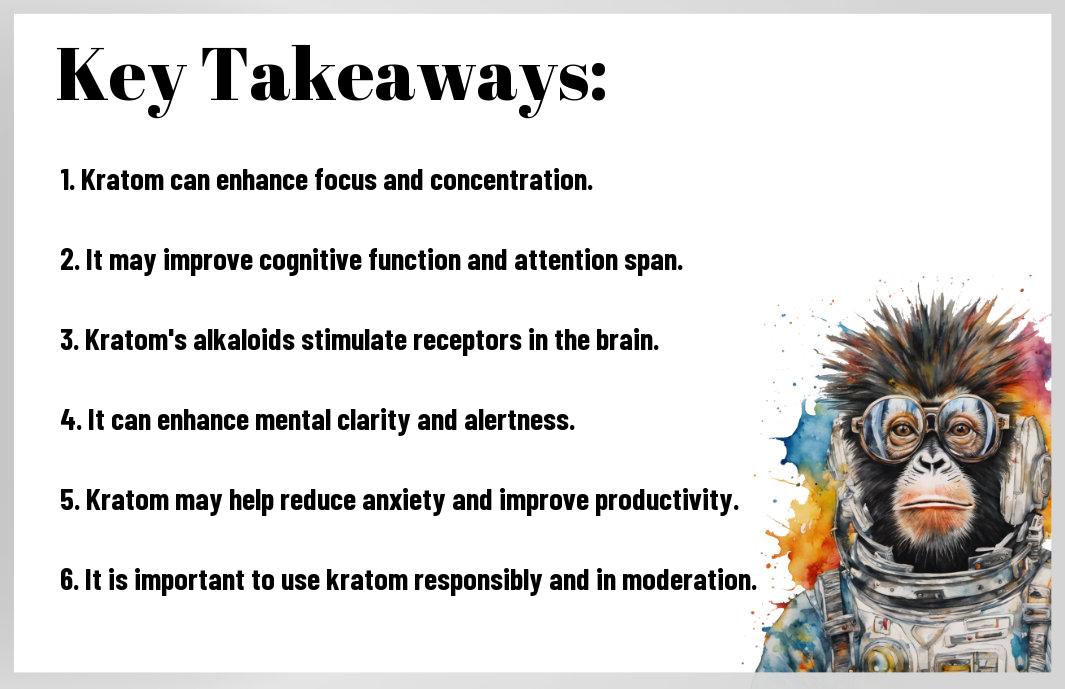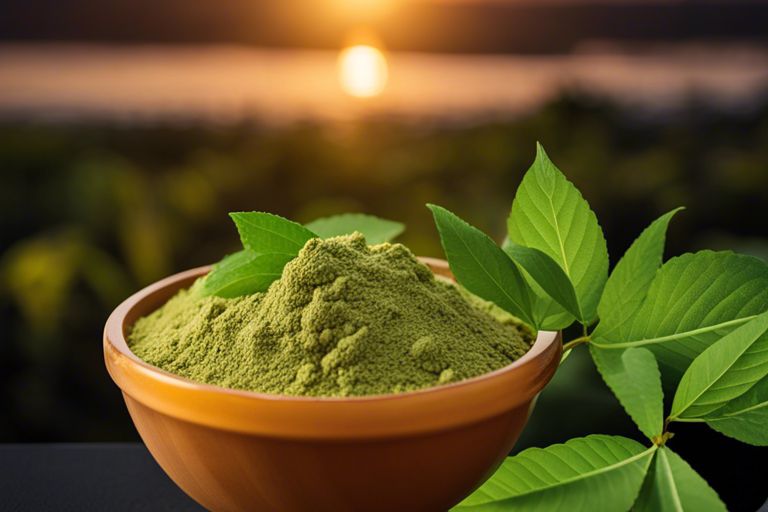Deprecated: mb_convert_encoding(): Handling HTML entities via mbstring is deprecated; use htmlspecialchars, htmlentities, or mb_encode_numericentity/mb_decode_numericentity instead in /home/users/kratomfiles/www/kratomfiles.com/wp-content/plugins/quick-adsense-reloaded/includes/template-functions.php on line 3552
In the realm of natural nootropics, kratom stands out for its rare and powerful ability to enhance focus and concentration. This Southeast Asian herb has been gaining attention for its potential as a cognitive enhancer, and its unique alkaloids are believed to interact with receptors in the brain to produce these nootropic effects. While the use of kratom for cognitive enhancement is still a topic of ongoing research, many individuals have reported experiencing improved mental clarity and focus when using this natural supplement.
To harness the potential nootropic effects of kratom, it’s crucial to source high-quality products from reputable vendors. For those interested in exploring the benefits of kratom, it’s essential to choose from the Best Kratom Brand Products For Sale: Top Kratom Vendors to Trust to ensure safety and effectiveness.
Key Takeaways:
- Kratom can enhance focus and concentration: Kratom has natural nootropic properties that can help improve focus and concentration when taken in proper doses.
- Alkaloids present in Kratom: The alkaloids present in Kratom, such as mitragynine and 7-hydroxymitragynine, interact with the brain’s opioid receptors, which can lead to improved cognitive function.
- Stimulation and Sedation: Depending on the strain and dosage, Kratom can provide stimulation or sedation, both of which can contribute to enhancing focus and concentration.
- Enhancing mental clarity: Kratom can help in clearing brain fog and promoting mental clarity, allowing individuals to focus better on tasks at hand.
- Potential as a natural alternative: Kratom’s ability to enhance focus and concentration makes it a potential natural alternative to synthetic nootropics for individuals seeking cognitive enhancement.

Kratom Basics
One of the most intriguing herbal supplements gaining attention in recent years is kratom, a plant native to Southeast Asia. Kratom, scientifically known as Mitragyna speciosa, has been used traditionally for its stimulating and pain-relieving properties. It is also known for its potential cognitive enhancing effects, making it a subject of interest in the world of nootropics.
Historical Use and Cultural Significance
Any discussion about kratom is incomplete without delving into its historical use and cultural significance in Southeast Asian societies. Indigenous communities in countries like Thailand, Malaysia, and Indonesia have been using kratom for centuries, incorporating it into their daily rituals and traditional medicine. Kratom has been valued for its energizing and pain-relieving properties, which were essential for the labor-intensive tasks performed by the locals. Additionally, it has been used as a social lubricant, bringing communities together during celebrations and gatherings.
Understanding the Plant and Its Varieties
On a botanical level, kratom is a tropical evergreen tree that belongs to the coffee family. It is recognized for its distinct leaves, which can vary in color and vein types, resulting in different kratom varieties. The most common varieties include red vein, green vein, and white vein kratom, each of which is associated with unique effects and potency. Historical accounts reveal that these variants were utilized based on the specific needs of the users, whether it was to alleviate pain, uplift mood, or boost productivity.
Historical evidence suggests that the locals recognized the inherent qualities of different kratom varieties, utilizing them according to their specific needs.
Legal Status and Availability Around the World
Basics of kratom legality and availability vary significantly across different parts of the world. While kratom is legal in some countries, it is strictly regulated or banned in others. It is crucial to be aware of the legal status in your region before purchasing or consuming kratom. In some areas where it is legal, kratom is available through specialized stores, online retailers, or even local markets. Conversely, in places where it is prohibited, accessing kratom may pose legal risks.
Worldwide, there is ongoing debate regarding the legal and regulatory status of kratom, with proponents highlighting its potential therapeutic benefits and low potential for abuse, while opponents emphasize the need for precaution due to potential adverse effects and misuse.
Kratom and the Brain: The Science Behind Its Effects
After centuries of traditional use, kratom is gaining recognition for its potential cognitive-enhancing effects. But to understand how kratom enhances focus and concentration, we need to delve into the science behind its effects on the brain.
Neurochemistry of Kratom
Any discussion of kratom’s effects on focus and concentration must begin with its impact on neurochemistry. Kratom leaves contain compounds called alkaloids, which interact with the brain’s receptors to produce various effects. The primary alkaloids in kratom, mitragynine, and 7-hydroxymitragynine, are known to modulate the brain’s opioid receptors, dopamine receptors, and serotonin receptors.
These interactions influence neural pathways associated with mood, motivation, and cognitive function, potentially leading to heightened focus and concentration. Moreover, kratom’s impact on neurotransmitters like dopamine and serotonin may contribute to its ability to enhance mental clarity and alertness.
Active Alkaloids and Their Roles
Science has revealed that the active alkaloids in kratom play pivotal roles in shaping its cognitive effects. Mitragynine, the most abundant alkaloid in kratom, exhibits opioid receptor agonism, while 7-hydroxymitragynine has been found to have an even stronger affinity for these receptors. These interactions can produce pain relief and mood enhancement, contributing to an individual’s ability to stay focused and attentive while minimizing distractions.
Additionally, these alkaloids may also influence the brain’s dopamine and serotonin systems, potentially contributing to improved concentration and mental clarity.
Interaction with Brain Receptors
Their interaction with opioid, dopamine, and serotonin receptors positions kratom as a complex modulator of brain function. By targeting these specific receptors, kratom may exert a dual influence on both immediate cognitive performance and long-term brain health. Furthermore, the simultaneous impact on multiple neurotransmitter systems could contribute to the nuanced and multifaceted effects of kratom on focus and concentration.
Interaction with these receptors may also lead to enhanced attention and cognitive flexibility, which are essential components of sustained focus and concentration.

The Nootropic Profile of Kratom
Now, let’s delve into the fascinating world of Kratom’s unique nootropic profile. Nootropics, also known as smart drugs or cognitive enhancers, are substances that are believed to improve cognitive function, particularly executive functions, memory, creativity, or motivation, in healthy individuals. They have gained popularity in recent years for their potential to enhance focus, concentration, and overall mental performance.
Defining Nootropics and Their Importance
With the growing demand for cognitive performance enhancement, the significance of understanding the role of nootropics in promoting mental clarity and productivity cannot be understated. Nootropics are designed to support brain health, improve cognitive function, and enhance overall brain performance without causing significant side effects or dependency.
The use of nootropics has expanded beyond traditional pharmaceuticals to include natural substances like Kratom, which has gained attention for its potential cognitive-enhancing effects. The ability of nootropics to stimulate the brain’s neurotransmitters and improve synaptic plasticity has made them a subject of great interest in the field of cognitive neuroscience.
Cognitive Enhancements: Focus and Concentration
Nootropics are often sought after for their ability to promote focus and concentration, especially in individuals facing challenges such as distractions, cognitive fatigue, or lack of mental clarity. These substances are believed to enhance attention span, increase mental energy, and promote a state of heightened alertness, which can be beneficial for individuals with demanding cognitive tasks or professions that require sustained mental acuity.
Importance of understanding the nootropic effects of Kratom lies in its potential to offer a natural alternative for individuals seeking cognitive enhancement, particularly in the context of increasing work productivity, academic performance, and overall cognitive well-being. By harnessing the cognitive benefits of Kratom, individuals may experience improved mental clarity, heightened focus, and enhanced productivity without resorting to synthetic pharmaceuticals.
Comparison with Traditional Nootropics
Nootropics are often categorized based on their mechanisms of action, duration of effects, and overall safety profile. When compared to traditional synthetic nootropics, Kratom stands out for its natural origin, diverse alkaloid profile, and reported cognitive-enhancing properties.
| Kratom | Traditional Nootropics |
| Natural origin | Synthetic compounds |
| Diverse alkaloid profile | Specific mechanism of action |
| Reported cognitive-enhancing properties | Well-established clinical evidence |
This comparison highlights the unique qualities of Kratom as a potential natural nootropic, providing a different approach to cognitive enhancement compared to traditional pharmaceutical options. It also emphasizes the need for further research and understanding of how Kratom’s alkaloids may contribute to its cognitive effects, given its distinct chemical composition and reported anecdotal benefits.
How Kratom Enhances Focus and Concentration
Despite the controversies surrounding its use, kratom has gained attention in the nootropic community for its potential to enhance focus and concentration. Users report that kratom can provide a mental clarity and improved cognitive function, making it a popular choice for individuals seeking a natural alternative to traditional stimulants.
On the flip side, some users have reported experiencing sedative effects at higher doses, which may hinder focus and concentration. It’s important to note that the effects of kratom on cognitive functions can vary depending on the dosage and individual tolerance. Understanding the dose-dependent effects is crucial in maximizing the cognitive benefits of kratom while minimizing any potential drawbacks.
Dose-Dependent Effects on Cognitive Functions
On a lower dosage, kratom is reported to have stimulating effects, which may lead to improved alertness and focus. However, at higher doses, some users have experienced sedative effects that may impair cognitive function and focus. Finding the optimal dose for cognitive enhancement is essential in harnessing the full potential of kratom as a nootropic.
Effects on cognitive function may also be influenced by individual factors such as tolerance, metabolism, and overall health. Academic studies have shown that kratom’s effects on cognitive function are complex and multi-faceted, with both positive and negative outcomes reported in various research studies.
Mechanisms of Action: From Alkaloids to Cognition
On a molecular level, the alkaloids present in kratom are believed to interact with opioid receptors in the brain, influencing neurotransmitter release and neuronal activity. This modulation of brain chemistry may result in improved focus, concentration, and cognitive function. The specific alkaloids responsible for these effects are still being studied, and their individual roles in cognitive enhancement are not yet fully understood.
Optimal Strains and Dosages for Cognitive Enhancement
Your choice of kratom strain and dosage can greatly impact its cognitive enhancement effects. Understanding the various strains and their unique cognitive impacts is crucial in achieving the desired focus and concentration benefits.
Strain Varieties and Their Cognitive Impacts
On the one hand, Maeng Da is known for its stimulating and energizing effects, making it popular for increasing alertness and mental clarity. On the other hand, Bali kratom is prized for its relaxing properties, which may help reduce anxiety and promote a calm, focused mind. Understanding the specific cognitive impacts of each strain is essential in selecting the most suitable option for your needs.
How to Determine the Right Dosage
The key to experiencing the cognitive benefits of kratom while minimizing potential side effects lies in finding the optimal dosage. The effects of kratom can vary significantly depending on the dosage, and it’s crucial to start with a low dose and gradually increase it until the desired cognitive enhancement effects are achieved.
For instance, a lower dosage of 1-3 grams of kratom may produce mild stimulating effects, while a higher dosage of 5-7 grams could lead to more sedative-like effects. It’s important to carefully monitor the effects of each dosage and adjust accordingly to find the ideal cognitive enhancement dose.
Potential Side Effects and How to Mitigate Them
With any substance, including kratom, there are potential side effects to be aware of. These may include nausea, dizziness, or irritability. However, these can often be mitigated by adjusting the dosage or trying a different strain. It’s vital to be mindful of these potential side effects and take appropriate measures to address them.
Their occurrence can also be minimized by ensuring you are sourcing high-quality kratom from reputable suppliers and being mindful of your individual sensitivity and tolerance levels.

Integrating Kratom into Daily Life for Enhanced Productivity
Not only can kratom help to enhance focus and concentration, but it can also be integrated into your daily routine to maximize productivity and performance. By incorporating kratom into your daily regimen, you can experience an increase in mental clarity and alertness that can lead to improved productivity and efficiency.
Best Practices for Consistent Outcomes
Daily consumption of kratom at the same time each day can help maintain a consistent level in your system, promoting stable energy and focus throughout the day. Additionally, keeping a journal to track your kratom consumption and its effects can help you identify the optimal dosage and strain for your individual needs.
Regular exercise and a balanced diet also play a crucial role in enhancing the effects of kratom. Physical activity and a healthy diet ensure that your body is in prime condition to benefit from the cognitive-enhancing properties of kratom, leading to sustained focus and improved productivity.
Lifestyle and Diet Considerations
Life can have a significant impact on the effectiveness of kratom. Adequate sleep, stress management, and a supportive social network can help create an environment conducive to optimal cognitive function. Consuming kratom on an empty stomach can also enhance its effects, as it allows for quicker absorption and onset of action.
This holistic approach to incorporating kratom into your daily routine can maximize its potential as a nootropic and promote sustained focus and concentration throughout the day.
Synergistic Supplements and Kratom
Enhanced productivity can be achieved by combining kratom with other supplements that complement its cognitive-enhancing effects. For example, omega-3 fatty acids, ginkgo biloba, and caffeine are known to synergize with kratom, amplifying its nootropic benefits and promoting heightened focus and mental clarity.
Supplements like magnesium and L-theanine can also help to mitigate some of the potential side effects of kratom, such as jitteriness or anxiety, while further enhancing its cognitive-enhancing properties.
Addressing Concerns and Navigating Challenges
For those considering the use of kratom for its nootropic effects, it is essential to address the concerns and navigate the challenges that come with it. In this chapter, we will debunk common misconceptions, provide safety guidelines, and highlight the need for future research and emerging trends in the use of kratom for enhancing focus and concentration.
Common Misconceptions and How to Counter Them
One common misconception about kratom is that it is addictive and leads to substance abuse. In reality, when used responsibly and in moderation, kratom is not inherently addictive. To counter this misconception, it is important to educate individuals about responsible use and the potential benefits of kratom as a nootropic.
Another misconception is that kratom is unsafe and can cause harm to the body. However, when used following recommended guidelines and dosages, kratom can be a safe and effective tool for enhancing focus and concentration. It’s important to provide accurate information and dispel myths to ensure individuals can make informed decisions about its use.
Safety Guidelines and Harm Reduction
An important aspect of using kratom for its nootropic effects is to follow safety guidelines and practice harm reduction. It is crucial to adhere to recommended dosage instructions and avoid excessive or prolonged use. Counter to popular belief, kratom can be safely incorporated into a healthy lifestyle, but caution and moderation are key to minimizing potential risks. Always purchase kratom from reliable sources to ensure its purity and quality, and be mindful of any potential interactions with other substances or medications.
Future Research and Emerging Trends
Reduction of the knowledge gap surrounding the long-term effects and potential benefits of kratom for focus and concentration is crucial. Further research is needed to explore its mechanisms of action and optimize its use as a nootropic. The emerging trends in the field of natural nootropics highlight the importance of continued investigation into the potential of kratom as a cognitive enhancer.
Harm reduction strategies should be a central focus of future research, with an emphasis on minimizing any potential risks associated with kratom use. Exploring the development of standardized guidelines and regulations for the use of kratom as a nootropic can ensure its responsible and safe integration into daily routines for those seeking cognitive enhancement.
Can DIY Kratom Potentiators also enhance focus and concentration like traditional Kratom?
Yes, DIY kratom potentiators for enhanced effects can also increase focus and concentration like traditional kratom. Ingredients like turmeric, grapefruit juice, and cayenne pepper can boost the effects of kratom and provide additional benefits, such as improved cognitive function and mental clarity.
Final Words
The rare nootropic effects of Kratom make it a promising tool for enhancing focus and concentration. Its ability to interact with the brain’s receptors and neurotransmitters can improve cognitive function, alertness, and mental clarity. Although more research is needed to fully understand its mechanisms, the potential benefits of Kratom in promoting productivity and mental performance are evident.
As with any supplement, it’s important to use Kratom responsibly and in moderation to avoid potential adverse effects. Consulting with a healthcare professional before incorporating Kratom into your routine is recommended, especially for individuals with underlying health conditions or those taking medications. Understanding the benefits and risks of Kratom in enhancing focus and concentration is crucial for making informed decisions about its use.
FAQ
Q: What is Kratom?
A: Kratom is a tropical tree native to Southeast Asia, known for its leaves that have psychotropic effects. It is commonly used as a traditional medicine and recreational drug.
Q: How does Kratom enhance focus and concentration?
A: Kratom contains alkaloids, such as mitragynine, that act on the brain’s opioid receptors, leading to improved focus and concentration. It also stimulates the release of acetylcholine, a neurotransmitter linked to cognitive function.
Q: What are the rare nootropic effects of Kratom?
A: Kratom’s rare nootropic effects include enhanced cognitive function, improved memory, and heightened mental clarity. It also has the potential to boost motivation and productivity.
Q: Is Kratom safe for enhancing focus and concentration?
A: When used responsibly and in moderation, Kratom can be safe for enhancing focus and concentration. However, excessive or prolonged use may lead to dependence and adverse health effects.
Q: How should Kratom be used for its nootropic effects?
A: It is important to consult with a healthcare professional before using Kratom for its nootropic effects. Dosage and strain selection are crucial, and it is essential to be aware of potential side effects and risks associated with Kratom use.










